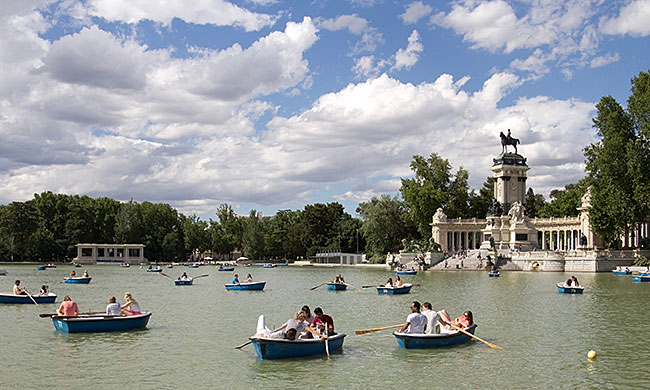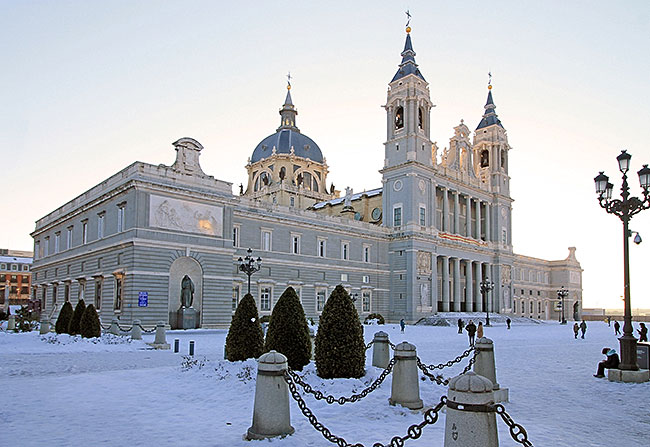Almost three years since my last installment! I again offer my advanced age as an excuse, lament that I never thought to employ this dodge for late homework assignments in fifth grade.
FAMILY TIES …
… strike me as sturdier here than in the U.S. Many Spaniards live unselfconsciously with their parents into their late twenties. They aren’t ‘boomerang’ kids; a boomerang can’t whizz back to its human if it isn’t thrown in the first place. (‘Ninis,’ they may be called, if the welcome mat has frayed.)
On the other side of the life arc, Spaniards may sacrifice heroically to care for Mom and Dad in their twilight years: may convert spare rooms, forego social events to pick up Dad’s meds, to help Mom shop. I intuit that many see these sacrifices as givens, minimums, like feeding a child.
(La convivencia isn’t always harmonious. To let off steam, the mother of one acquaintance barges regularly into her middle-aged daughter’s bedroom to holler about Daughter’s supposed transgressions. Daughter’s international Zoom buddies have gotten to know Mom this way; Mom doesn’t stay out of camera range while ranting.)
HOW SPANIARDS DIFFER FROM AMERICANS
Guardedly, squeamishly, I offer a few seat-of-the-pants generalizations, while noting once again that I meet an unrepresentative share of Spaniards eager to burnish skills in a second language. That wasn’t me in the bar after the bullfight.

(♦) A wiser world view. The Great Recession forced many Spaniards to move abroad for work, as noted in Impressions: Round Three, to see how things are done in other countries. Those who didn’t still live much closer to other nations than do most Americans. Madrid is roughly as far from Paris, Zurich and Rome as Los Angeles is from, respectively, Albuquerque, Denver and Billings, Montana. One hears things.
The country also has been through a lot: Civil War, dictatorship, a 1981 coup attempt, a de facto second civil war with terrorist ETA, Catalan separatism. Even unwilling students learn from such trials. Angela Merkel has lamented youth’s forgetting of bitter lessons learned by their elders. Spaniards haven’t had time to forget: Catalan separatism is on the front burner now, and ETA didn’t formally shut down until 2018.
(♦) More timid about new business projects. Americans start things. If they fail, they get up, dust themselves off and try again. In the states, I regularly met Americans who spoke unbashfully of past business failures. One could feel ashamed of leaving partners and customers in the lurch, but not of giving it your best shot, of making an honest effort.
In contrast, in Spain, according to several natives: ‘a business failure is forever.’ I don’t know why this is so. Steve Jobs told Europeans almost forty years ago that entrepreneurs here need to be given a second chance if they fail. Some have spoken of tax issues, others of an unforgiving culture.
(A possible example of ‘unforgiving’: the savaging of former Madrid mayor Ana Botella for her ‘relaxing cup of coffee’ speech, although the savagers already may have disliked Ms. Botella for other reasons.)

I described the ill effects of this trait in my Round Six post, see them more than ever as the pandemic winds down. Poorer work prospects are the largest negative of life here.
NOT AS DIFFERENT AS THEY WERE
A relative lived in Spain during the dictatorship. Adaptation must have been much tougher in an unconnected world, without online translators and dictionaries. But he also had the opportunity to join a culture that differed much more markedly from that of the U.S. left behind.
Some singularities survive. Americans don’t gobble grapes on New Year’s Eve; their kids leave baby teeth under pillows for the tooth fairy, and not for Ratoncito Pérez. But differences are fewer, less pronounced. Thanksgiving and Independence Day won’t make it across the Atlantic, but Halloween has, and so has Black Friday. I noted more fashion variances between Santa Monica, California and Tracy, California than I have between Santa Monica and Madrid. Global online connectivity erodes barriers, smooths transitions, but also makes life more homogenous, a little more dull.
SPANISH INFERIORITY COMPLEX
Spain leads the world in organ transplants. True, this may be partly because Spain’s ‘opt out‘ system gives a sawbones freer reign to ransack expiring bodies for harvestable organs. (Although an NCBI article suggests that any ‘opt out’ advantage is overrated.) But, that said: world leader. A bit more prestigious than, say, the blue ribbon in Nathan’s hot dog eating contest.
I don’t see how an other than first tier country could take such a title, but some natives still regularly talk trash about Spain and Spaniards. Several have voiced variations of the Africa-slandering “Europe ends in the Pyrenees.” They also mythologize life in other countries, the U.S. especially. (Although this mythification took a predictable hit during the Trump administration, and — in my subjective experience in intercambios — after the Paddock mass murder in 2017.)

Paradoxically, I see more national flags on Covid masks and other apparel than I did in California. I don’t get it.
MORE PUBLIC TRANSIT DIFFERENCES
(♦) America’s most impassioned transit boosters would want to call taxis for some of the creaky-limbed octogenarians I regularly see hobbling into Madrid metro stations: clutching hand rails, staring doggedly at vulnerable knees as they lower one foot after another onto stair steps, while the young dart obliviously past them. Do they represent a potential downside to daily life in a world class transit city? I don’t know. I do know that I rarely saw anything similar in California.
(♦) On the other hand, in California buses and trains I regularly encountered the mentally ill (and remember dealings with these folk as the bane of my life as a TransitPeople trip leader). I have seen only two L.A.-caliber transit cuckoos in more than five years in Spain.
(Mendigos, though: a very different story. Madrid’s metro will introduce many, but they are sane, self-composed; they recite their pitches, collect what they can, pirarse.)
ODDS AND ENDS
(♦) No Spaniard met to date has served on a jury. Different country, different legal system.
On the other hand, Spaniards do expect to be called as mandatory election workers.
(♦) So what’s the deal with the giant bulls occasionally seen alongside Spain freeways? Here you go: Osborne bull.
Photo credits:
- Tio Pepe sign at Puerta del Sol: Udo Schuklenk, CC BY-NC-ND 2.0
- Estanque Grande, Retiro Park: Carlos Delgado, CC BY SA 4.0
- Palacio de Cristal, Retiro Park: Veronika Bashak, CC BY SA 4.0
- Almudena after Filomena: Luis Garcia, CC BY SA 4.0
